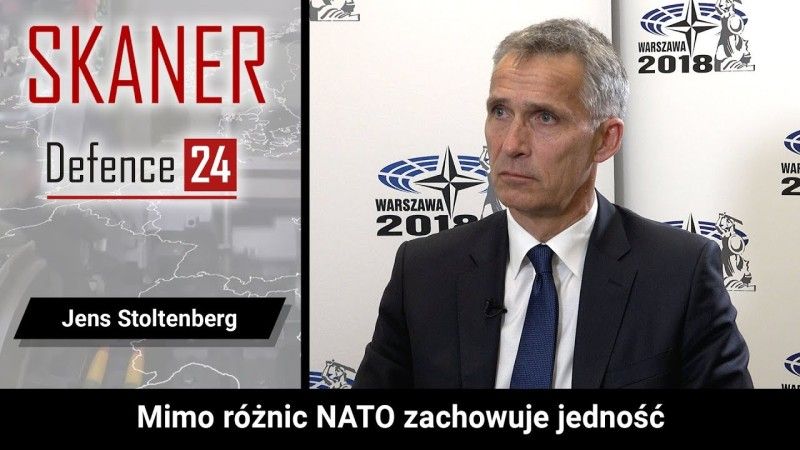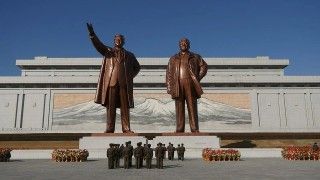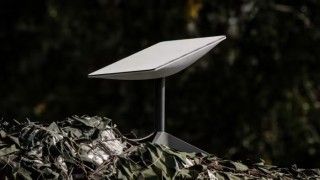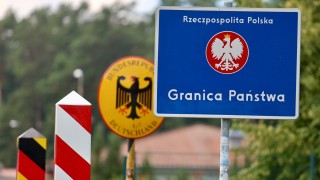- WYWIADY
Stoltenberg for Defence24: NATO - Unity Despite Differences [SKANER]
In Skaner Defence24 TV program NATO Secretary General Jens Stoltenberg assured that NATO is devoted to the collective defense despite the growing number of issues, which have divided members. During the interview he said that the decision about the new land component of command structure would not be undertaken during forthcoming NATO summit in Brussels in July. Simultaneously, he positively assessed the pace of work on the NATO command structure reform.

During Monday NATO parliamentary Session, which took place in Polish Parliament Stoltenberg enumerated the five main topics for the NATO summit in Brussels. He mentioned: deterrence and defence, logistics support and mobility of the armed forces, projecting stability outside the Alliance territory, cooperation with the EU, setting up news commands and the fair division of military expenditures among the member countries. In Stoltenberg’s opinion it is pointless to indicate which one is the most important.
(...) they are so much interlinked. For instance we have the issue of deterrence and defense, and we have the issue of defense spending budget. And of course that’s very much interlinked. You cannot increase the NATO’s deterrence and defense without investing more. And also we’re speaking about projecting stability which includes fighting terrorism. And I think that NATO has to be able to both deliver collective defense in Europe, but, at the same time, project stability beyond those borders and to fight terrorism. So there’re many topics at the NATO summit but they are all interlinked. They are all about making sure that the close to 1 billion people living in the NATO country can live in safety and be secure, thanks to NATO credible deterrence and defense.
Stoltenberg also answered to the question on the emerging differences among the allies.
I think what we have seen is that there’s an increase in the number of issues, where we see differences between the NATO allies. And of course I always like when all NATO allies agree on all issues. But that will never happen. So we have seen before and we willl see again, that on some political issues, also serious issues, there will be different views, differences among NATO allies. My message today, at the NATO parliamentary assembly is that this is nothing new. (...) The strength of NATO is that, despite these differences, we have been able to unite around our core task. And that is to protect and defend each other. So when we today see differences on the Iran nuclear deal, or on trade issues, or on climate change: These are important issues. But at the same time NATO has been able to stay united around our core responsibility, collective defense. And we have not only been able to stay united, but we have also implemented the biggest reinforcement of our collective defense since the end of the Cold War.
One of the interview topics was the change of NATO command structure. According to the plans, the new two Joint Force Commands will be set up. The first one will be in the United States with the responsibility to protect the communication on the Northern Atlantic. The second one will be responsible for logistic support and will be located in Germany.
However, no decisions have been made to the future of the land component commands that are placed one level lower in the hierarchy. They are to command several corps, so they are frequently called army commands. Poland wants one of these commands to be established within its territory. Stoltenberg admitted that this decision would not be made during the Brussels summit in July. Defence24.pl obtained information that, the Polish authorities were not satisfied with the pace of work progress.
Things are actually going quite quickly when it comes to the command structure. It’s not so many months since we agreed to asses, reform and adapt the command structure and we will have decisions by the summit, on all the main elements - Stoltenberg said.

Image Credit: R. Surdacki / Defence24.pl
The NATO Secretary General added that no decision should be expected of the land component command final location. Stoltenberg said that this would not delay the implementation of the command structure changes, because the process is going spread in time. The Secretary General admitted that no recommendations are ready yet. It is the task of the SACEUR, Gen. Curtis Scaparotti.
I understand the need for having a NATO military presence in the eastern part of alliance, so also Poland and the Baltic countries. But we have already delivered that and we have to make sure that we continue to deliver, for instance with the battlegroups which we are now deployed to the Baltic countries and Poland.
Referring to the NATO’s ability to reinforce the allies in crisis scenario, Stoltenberg underscored the importance of readiness and the ability to rapidly move certain tactical formation of land, naval, air forces as well as the preparation of special and cyber operations.
Defence24.pl also asked Stoltenberg about the NATO Parliamentary Assembly session that recently took place in Warsaw. On Monday Stoltenberg participated in discussion with the MPs. In Skaner Defence24 TV program Secretary General stressed that well-functioning parliament plays key role in every of 29 democracies of NATO. It was a great pleasure to participate in NATO Parliamentary Assembly and discuss such important topics as deterrence, defence, stability and defence expenditures – The Secretary General said.
Interview conducted by Rafał Lesiecki
Production: Paweł K. Malicki, Rafał Surdacki
Cooperation: Andrzej Hładij, Jacek Siminski














